Table of Contents
Piperine is an alkaloid extracted from Black Pepper (Piper Nigrum). And used to increase the bioavailability and metabolism of nootropic supplements and drugs.
Piperine was discovered in 1819 by Hans Christian Ørsted who isolated it from Piper Nigrum. This is the same Danish chemist who figured out that electric currents create magnetic fields.[i]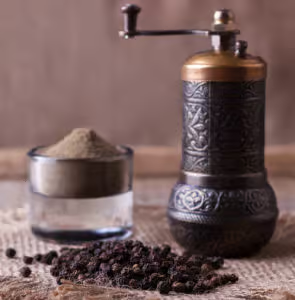
Piperine makes nootropics and pharmaceuticals more bioavailable by inhibiting the drug transporter P-glycoprotein, and the major drug-metabolizing enzyme CYP3A4 active primarily in your liver.[ii]
Piperine does more than just boost the action of your nootropic stack. It acts as a nootropic as well. In this article we investigate how Piperine can help optimize your brain.
Piperine helps:
- Nootropic Effectiveness. Piperine inhibits the drug transporter P-glycoprotein, and the drug-metabolizing enzyme CYP3A4 in your liver. Allowing more of each nootropic in your stack to be absorbed and used as intended.
- Neurotransmitters. Piperine is a powerful monoamine oxidase (MAO) inhibitor (MAOI). Boosting serotonin, dopamine and norepinephrine levels in the brain. Decreasing anxiety, improving mood and memory.
- Neuroprotection. Piperine has potent antioxidant, anti-inflammatory, and anti-tumor capabilities. Helping to reduce toxic free radicals and protecting your brain from oxidative damage.
Overview
Piperine is an alkaloid extracted from Piper Nigrum (Black Pepper). And used to boost the effectiveness of other nootropics and drugs.
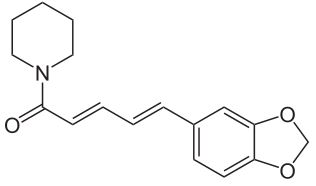
Black Pepper (Piper Nigrum) is a flowering vine native to south India. Its dried fruit is used world-wide as a spice and seasoning.
Research has found Piperine can protect against oxidative damage by inhibiting free radicals and reactive oxygen species. Piperine protects against oxidative stress. And has been found to have anti-mutagenic and anti-tumor capabilities.[iii]
But Piperine’s biggest claim to fame is its ability to boost the effectiveness of your nootropic stack.
Piperine’s effects are similar to grapefruit juice and St. John’s wort. It inhibits the drug transporter P-glycoprotein, and the major drug-metabolizing enzyme CYP3A4. Amplifying the effect of nootropics by preventing elimination in your liver and urine. And allowing increased absorption for use by your body and brain.
How does Piperine work in the Brain?
Piperine boosts brain health and function in several ways. But two in particular stand out.
- Piperine is an anti-depressant. Piperine is a monoamine oxidase (MAO) inhibitor (MAOI). Piperine inhibits both MAO-A and MAO-B. Research has found that Piperine is as effective as the popular pharmaceutical antidepressant Prozac® (fluoxetine).[iv]
Piperine has a profound effect on serotonin in the brain. Piperine has been shown in the lab to provide a substantial increase in serotonin (5-HT) in both the hippocampus and frontal cortex.[v]
And this is where it gets very interesting. Scientists found that combining Piperine with Resveratrol provided significant antidepressant action. But this stack also offered relief from oxidative stress, inflammation and provided neuroprotection.[vi]
Resveratrol on its own is a good antidepressant. And Piperine also provides antidepressant action as a MAO Inhibitor and serotonin booster. When combined, Piperine also boosts the bioavailability of Resveratrol. This combination is a potent natural antidepressant. Without the side effects that come with prescription MAOI’s and SSRI’s.
- Piperine boosts bioavailability. Piperine inhibits the drug transporter P-glycoprotein, and the major drug-metabolizing enzyme CYP3A4. This can have profound implications on how well and how much of each nootropic in your stack actually gets to your brain.
Your liver protects you by attaching a glucuronide molecule to nootropics (and drugs) which sends a signal for them to be excreted in your urine. This process prevents excessive levels of nootropic supplements (and drugs) in your body. But it can also work against your brain optimization goals.
A great example is curcumin, the bioactive compound found in turmeric. You will not experience the medicinal properties of curcumin when taken on its own. Curcumin has very poor bioavailability when taken as a supplement because of its rapid metabolism in your liver and intestinal wall.
Researchers in India gave mice 2 grams/kilogram of curcumin and tested blood levels over 4 hours. Very small amounts of curcumin were detected in blood in the first 2 hours.
The scientists then administered the same amount of curcumin combined with 20 mg/k of Piperine. Blood levels of curcumin were detected sooner with Piperine added. And stayed in the blood longer. Bioavailability of curcumin in mice increased by 154% when combined with Piperine.
The researchers then tried the experiment with humans. A 2-gram dose of curcumin on its own was not detectable in blood samples. But curcumin combined with Piperine in humans made a profound difference.
2-grams of curcumin combined with 20 mg of Piperine in humans showed up in blood samples within 15 minutes. And Piperine increased the bioavailability of curcumin by 2000%.[vii]
How things go bad
The job of our liver is to clear our body of unwanted compounds and toxins. And excrete them as waste through our urine. But some of the nootropics and especially prescription drugs are seen as “foreign matter” by our liver. And are eliminated as ‘waste’ even if our intention was to benefit our body and brain.
To make matters even worse, include getting older. Our brain chemistry and energy metabolism changes.
↓ Serotonin, dopamine and norepinephrine levels decline
↓ Recall, reaction time and mood diminish
↓ Toxins, oxidation and free radicals damage neurons
↓ Brain cell membranes degenerate
↓ Bioavailability of nootropics and supplements decline
All of these changes can happen at any age. And some are contributing factors to the neurodegenerative diseases of aging, including Alzheimer’s and dementia.
This is where Piperine can help.
Piperine to the rescue
Research from hundreds of studies have shown that Piperine will:
- Boost the bioavailability of nootropics
- Increase the effectiveness of nootropics
- Work as an antidepressant
- Relieve oxidative stress
- Prevent inflammation
- Provide neuroprotection
- Protect against tumors and cancers
How does Piperine feel?
Piperine on its own has antidepressant capabilities. So you may feel your mood improve.
If you are using curcumin or turmeric for its anti-inflammatory benefit, you’ll likely find that these supplements will be much more effective in relieving pain by adding Piperine.
You should notice a substantial benefit in the effectiveness of most nootropics and prescriptions meds when stacked with Piperine.
Some neurohackers report a reduction in anxiety (that can be caused by some supplements) by taking it with Piperine.
If you are dealing with arthritis you may find pain levels will decrease by using Piperine. This nootropic is a potent anti-inflammatory even on its own.
You may be able to reduce the amount of some nootropics and medications by stacking them with Piperine. Because the effectiveness of most of these supplements and meds will get a boost by combining them with Piperine.
The Research
Piperine Potentiates the Effects of Curcumin
Stress in everyday life puts every one of us in danger of developing some type of cognitive disorder. And curcumin is a proven therapy to help protect us from this assault on our cognition and brain health.
To help illustrate what happens in our brain when under stress, scientists subjected male Laca mice to stress-induced cognitive impairment for 28 days.
Chronic stress impaired memory, locomotor activity, elevated toxins like nitrate, decreased the master antioxidant glutathione, damaged mitochondria enzyme function, reduced acetylcholine levels, and increased stress cortisol levels.
Researchers then treated the mice with either 200 or 400 mg/k per day of curcumin. All of the damage caused by stress was reversed to a certain extent.
Then the team added 20 mg/k of Piperine to a reduced daily curcumin (100 or 200 mg/k) supplement. The results clearly demonstrated that Piperine enhanced the bioavailability of the curcumin. And greatly potentiated the effects against stress-induced cognitive impairment.[viii]
Piperine as an Antidepressant
Researchers injected mice with 60 mg/k of Piperine. An hour after the injection, the team measured serotonin, dopamine and norepinephrine levels. Serotonin levels were significantly higher in the cerebral cortex of the mice. Dopamine levels were markedly higher in the hippocampus, midbrain and cerebellum. And norepinephrine levels were lower in every part of the brain.[ix]
Scientists in Korea analyzed Piperine (ethanol extract) for its monoamine oxidase (MAO) inhibitor capabilities. Piperine showed an inhibitory effect against MAO-A and MAO-B.
The team found that Piperine exhibited the same type of antidepressant effect in the brain as the popular prescription drug Prozac® (fluoxetine).
The researchers concluded that Piperine possesses potent anti-depressant properties. And Piperine is a promising pharmacotherapeutic candidate as an antidepressant agent.[x]
Piperine Protects Against Alzheimer’s
A study conducted in Thailand looked at Piperine’s effect on memory and neurodegeneration in an animal model of Alzheimer’s Disease.
Adult male Wistar rats were given Piperine at doses ranging from 5, 10 and 20 mg/k of body weight for 2 weeks before and 1 week after artificially induced Alzheimer’s-like conditions in the rat’s brain.
The results showed that Piperine at all dosage ranges significantly improved memory impairment and neurodegeneration in the hippocampus.
The scientists speculated the mechanism of action for Piperine to produce these effects could be a decrease in lipid peroxidation and the acetylcholinesterase enzyme. (This enzyme degrades acetylcholine synthesis in the brain). Piperine also demonstrated a neurotrophic effect in the hippocampus.[xi]
Dosage Notes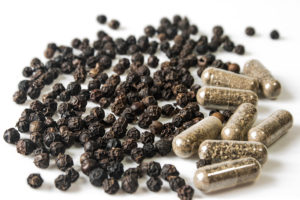
The recommended dosage of Piperine to enhance bioavailability of nootropic supplements is 5 – 20 mg per day.
Many nootropic stacks and some supplement formulas (i.e. curcumin, turmeric and resveratrol) come pre-stacked with the appropriate dose of Piperine.
For example, Performance Lab® Energy uses the patented BioPerine® form of Piperine in their premium energy stack.
I love this energy stack and use it twice a day instead of the morning and noon doses of ALCAR I used in the past.
This pre-formulated nootropic stack also includes the patented forms of MicroActive® Q10, BioPQQ®, and Bio-enhanced® Na-RALA (alpha lipoic acid).
You can see my full review here of how I use the Performance Lab Energy stack in treating Adult ADD.
Side Effects
Piperine is an extract of Black Pepper and considered non-toxic and safe to use at recommended doses.
Piperine potentiates the effect of nearly all nootropic supplements and prescription medications. So be very aware that boosting the effects of certain supplements or drugs could produce unwanted consequences.
Be cautious of using Piperine in addition to Piperine that may already be in one or more of your supplements. Too much Piperine will not only amplify most of the supplements and drugs you’re taking. But could also negate the effects of some.
Available Forms
BioPerine® is a patented form of Piperine made by Sabinsa Corporation. And licensed to other supplement manufacturers to include in their formulas, or as a standalone product. It’s the only source I’m aware of who have clinical studies to back up their claims of safety and efficacy.
You can also get Piperine by grinding black peppercorns on your food. The problem is there is no way to measure how much Piperine you’re actually using.
Nootropics Expert Recommendation
Piperine up to 20 mg per day
 We recommend using Piperine as a nootropic supplement.
We recommend using Piperine as a nootropic supplement.
Your body does not make Piperine on its own. So you must take it as a supplement.
Piperine is especially helpful for boosting the bioavailability of other nootropics in your stack.
Beware that Piperine also amplifies the potency of other supplements and meds you are taking. Boosting the effect of certain SSRI’s and some other meds could be extremely dangerous.
Piperine is also an effective antidepressant, and can help lower stress and anxiety. Piperine is a potent anti-inflammatory and could help reduce pain if you are dealing with arthritis. Or other conditions caused by excess inflammation in your body.
Piperine is a powerful neuroprotectant and makes a great addition to any nootropic stack.
You can buy Piperine or BioPerine® as an individual supplement. And some premium pre-formulated nootropic stacks like Performance Lab® Energy include BioPerine.

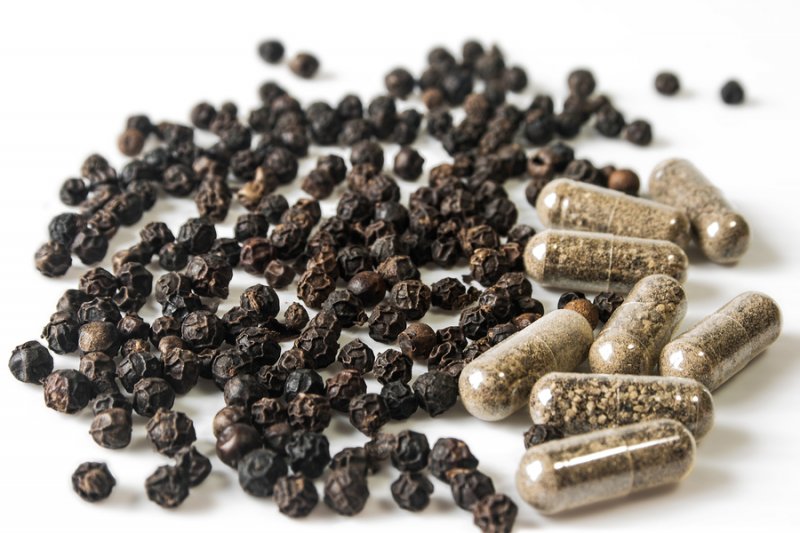
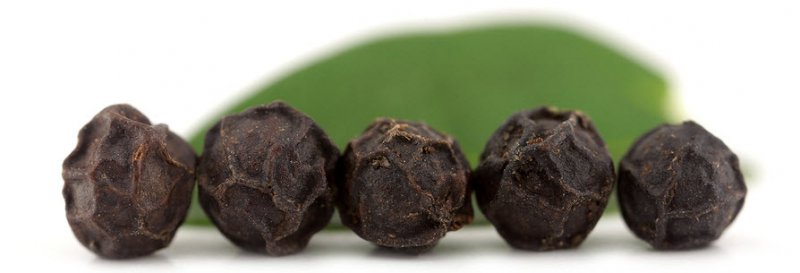

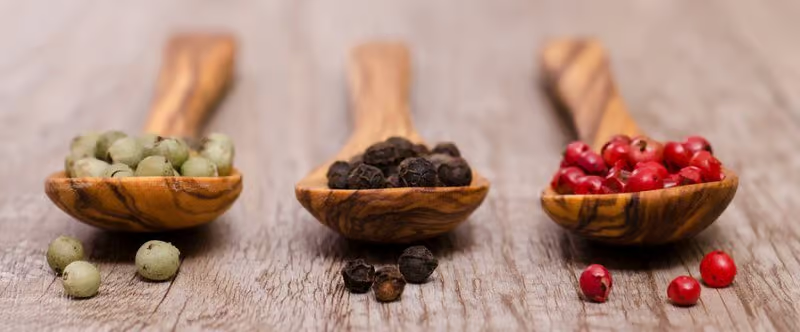





Join The Discussion - 79 comments
Andrew Richardson
December 8, 2022
I have 10MG is Piperine would this be safe taking this with Astaxanthin 10MG daily?
David Tomen
December 10, 2022
Should not be a problem Andrew.
Christopher Dockstader
December 1, 2022
You might want to mention on side effects explosive diarrhea.
David Tomen
December 4, 2022
Christopher, “explosive diarrhea” never came up in my research. So it must be extremely rare especially if used a recommended adult dosages.
Alex
October 20, 2022
Great article. thanks.
Does Piperine attach to the -nicotinic acetylcholine receptors- in the brain?
David Tomen
October 22, 2022
Alex, negative. Piperine acts like a monoamine oxidase inhibitor (MAOI).
Blaine
September 27, 2022
David, is it safe to consume a reasonable amount of alcohol while using Piperine as a supplement? I take 10-20mg per day.
David Tomen
September 27, 2022
Blaine, Piperine may potentiate the effects of alcohol.
Sandra
May 31, 2022
Hi David! I dont know If I understand correctly…
I take all my MAOI at 8 a.m
– Curcumin 1000mg
– Rhodiola 250mg
– Bioperine 30mg
– Gingko Biloba 240mg
Is this good idea? Every MAO boosts the same ammout of dopamine and serotonin? Or my thinking is wrong. Thank you!
David Tomen
May 31, 2022
Sandra, don’t think about this comparing it to prescription MAOIs because it’s not an accurate comparison. Just because a supplement “acts like an MAOI” usually means that is just one of its many benefits.
The stack you take is a good stack. I would reduce your BioPerine to no more than 20 mg. You really need only 10 mg BioPerine. And I would take that stack again at noon.
And keep in mind Curcumin is fat-soluble so you need to use this stack with a healthy oil. I personally use a tablespoon of unrefined coconut oil every time I take my stack to ensure all the fat-soluble ingredients in my stack are digested and get used by my cells.
sheldon hutchings
February 9, 2022
hey david would appreciate it if you replied. hope all is well.
just wondering if taking the Bioperine would make the cvd vaccine more potent? as it enhances the absorption of drugs.
thank you for your time.
David Tomen
February 10, 2022
Sheldon, vaccines don’t work like that. They are not metabolized in your liver and then used by your body like regular supplements. It is injected directly into your bloodstream. So BioPerine should not affect it at all.
Joan
December 20, 2021
Hi David, thanks for your knowledge.
Do you think it makes sense to use Piperine for headache instead of taking ibuprofen? As piperine has antiinflammatory properties, but I wonder what would the dosage be. As a fact I tried 30mg and it seemed to work.
David Tomen
December 20, 2021
Joan, there are plenty of anti-inflammatories to choose from. But you need to be careful with Piperine because of its effects on the drug transporter P-glycoprotein, and the major drug-metabolizing enzyme CYP3A4. Any other drug or nootropic that uses that transporter and/or enzyme will be potentiated when you use Piperine. And in some cases that could be dangerous.
Moha
October 16, 2021
Thanks David for being holistic, now which nootropic do you mostly recommend for mitochondrial energy, in order for neurons to fire at all corners. Thanks
David Tomen
October 16, 2021
ALCAR, Alpha Lipoic Acid, CoQ10 and PQQ will help make adenosine triphosphate (ATP) in mitochondria for a pure, clean energy boost. It takes more than one supplement because each enter the Krebs cycle which is the cycle needed to make ATP.